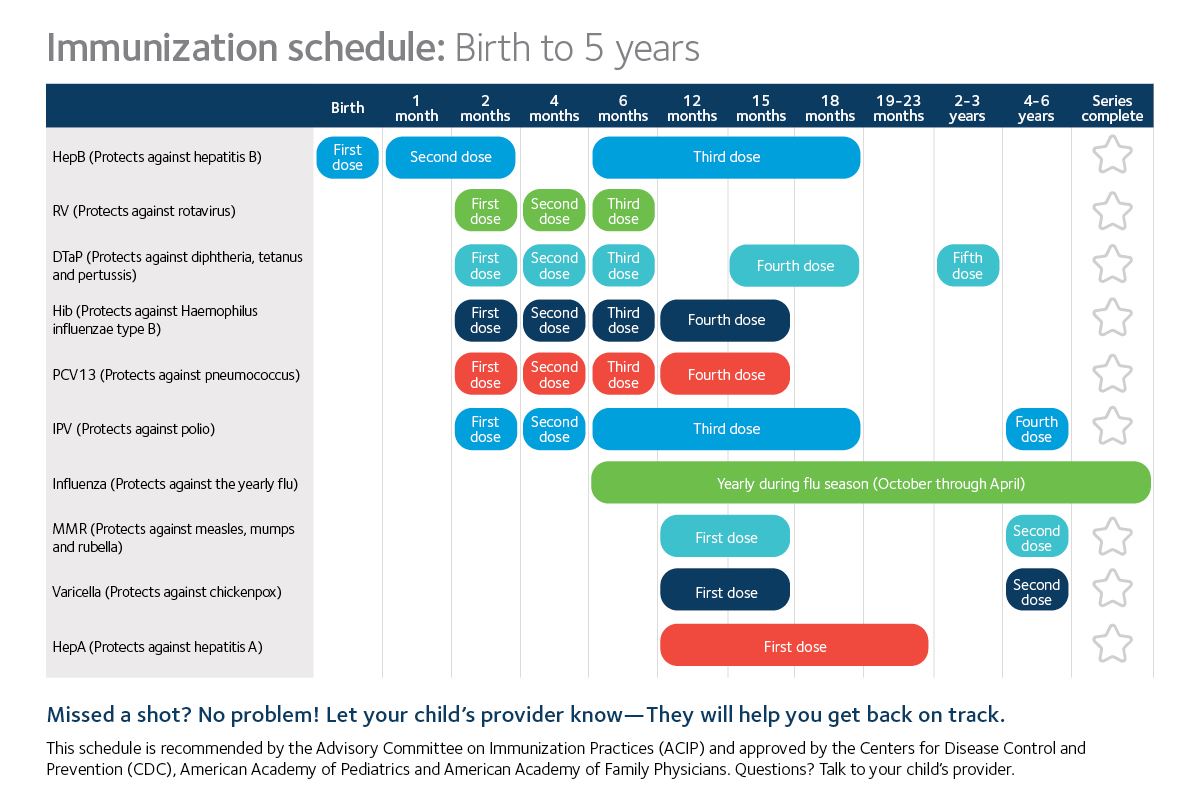
Immunization schedules: What to expect during your child’s first five years
Babies are born with some immunity to harmful diseases. But in the first few months, that immunity wears off. Thankfully, immunizations can increase your child’s immunity so that they stay safe as they grow.
What immunizations does my child need?
The Centers for Disease Control and Prevention (CDC) has recommended vaccination schedules for infants, teens and adults. In the first six months of life, the CDC recommends your child receive:
- HepB, which protects against hepatitis B, a liver infection.
- RV, which protects against the rotavirus, a disease that can cause diarrhea.
- DTaP, which protects against diphtheria, tetanus and pertussis (whooping cough).
- Hib, which protects against Haemophilus influenzae type b, a serious blood infection.
- PCV13, which protects against pneumococcus, a disease that can cause pneumonia.
- IPV, which protects against polio.
From ages 6 months to 6 years, the CDC also advises that your child have:
- Flu vaccine, an annual shot to protect from influenza.
- MMR to protect from measles, mumps and rubella.
- Varicella, which protects against chickenpox.
- HepA, which protects against hepatitis A, another type of liver infection.
Why are vaccines important?
The goal of a vaccine is to prevent diseases, rather than treat them when they occur. And thanks to vaccinations, many diseases that used to be common in the United States, such as polio or whooping cough, are preventable. In fact, vaccines have completely gotten rid of smallpox transmission, which used to be deadly.
When your body is exposed to a specific germ or virus (called antigens), you produce antibodies. Antibodies are proteins specifically designed to fight certain antigens. But it would be ideal if you could produce disease-fighting antibodies without ever getting sick.
That’s what vaccines do. Vaccines contain small portions of specific antigens, but only in a high enough dose to help your body produce antibodies, not in a high enough dose to make you sick. Vaccines are safer than being exposed to a disease. And they allow your child to build immunity without ever suffering through the disease.
How did experts come up with the vaccine schedule?
Experts have made immunization recommendations based on clinical trials and research. “When babies are born, they still have some antibodies from their mom. These antibodies give them immunity against certain diseases,” explains Dr. Theodore Zwerdling, MD, pediatrician with Adventist Health Feather River. “Over their first six months of life, that immunity starts to wane.” The immunizations are like boosters to a baby’s immune system.
Vaccines are also based on what infections you are more likely to get at a certain age, Dr. Zwerdling explains. “For example, babies have a higher risk of developing polio, but a lower risk of developing human papillomavirus (HPV). That’s why we give the first polio vaccine to infants and the HPV vaccine at older ages.”
You can see a sample immunization schedule below:

What happens if my child misses a vaccine dose?
Dr. Zwerdling explains that if your child misses a vaccine dose, there are schedules to make them up that are just as effective. “But it’s important to understand why an immunization was missed,” he notes. “Sometimes, parents get worried that too many vaccines at once will overwhelm the immune system. Actually, our immune system is stimulated every day by germ invaders in our body. The stimulation caused by vaccines is much, much smaller.” In other words, vaccines do not overwhelm the immune system or make you sick.
“There are very few vaccines that have one specific due date,” Dr. Zwerdling says. “If you forget about an appointment, have a scheduling conflict or miss a vaccine for any other reason, speak with your child’s pediatrician. Many vaccines can be given within a period of a few weeks without putting your child at any undue risk.”
Make sure your child receives care from a trusted pediatrician. Find a provider near you today.




